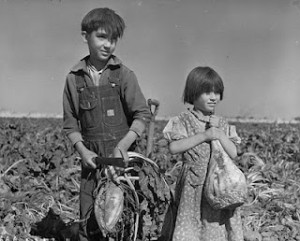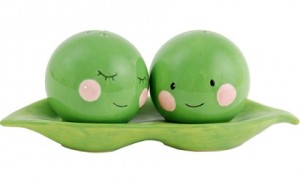I once had the incredible privilege of keynoting an annual event hosted by a hospice federatrion. It’s an amazing group of devoted staff and volunteers who make sure that people’s last days on Earth are as pain-free and fulfilling as possible.
people’s last days on Earth are as pain-free and fulfilling as possible.
At the end of the luncheon, hospice volunteers brought out cloth bags filled with small ceramic hearts. Each heart had an inspirational word engraved on it, and we were asked to choose one without looking.
The word engraved on my heart was “MAGIC.” I had just been talking about my book, 30 Lessons for Living, and suddenly an image flooded my mind. One of the hundreds of elders we surveyed about their life wisdom had impressed me especially deeply. And that was because she used the word “magic” in a very surprising way.
Edwina, 94, had a fascinating life. Her father homesteaded in northeastern Montana, and she grew up on a small farm near the North Dakota border (she chuckled: “You probably don’t know anything about Montana since you’re a New Yorker!”).
She reflected on her experiences:
“We were never hungry. And it was a wonderful place to grow up. I had a good childhood. And I had four brothers and a sister. It was a wonderful place to live. We learned so many things that you don’t have to teach your children.
For one thing, I had a horse all my own. I learned that you took care of your horse. You treated it like you should and you learned to take care of things. And we had good neighbors and we were good neighbors. We either had to walk to school or ride to school for two and a half miles. While I was a child, we had to get up early because we had cows to milk, cows to go get, chickens to feed and things, before we went to school. We learned how to work. We learned the joy of getting up in the morning and seeing the sun come up. And to this day I get up early.
One of the most important things that I have learned is be yourself. My mother had an old saying, “Straighten up your back Edwina, and be somebody. Be proud of yourself and be proud of your name. Be careful. When you have a name, it’s precious. You want to protect it.” And I guess that’s about all I have to say about that. I could probably talk forever.
Edwina had two wonderful marriages. Her first husband died after 32 years of marriage, and Bertha waited a long time to get married again: “I was eighty-five!” He had died shortly before our interview after nearly a decade of happiness together.
But what rushed into my mind when I was handed the heart that said “MAGIC” was what Edwina had to say about aging. She was asked: “What advice would you give to younger people about growing older? What do you think you would tell them?” There was a pause, almost as if she was casting a glance back over such a long and full life. Then she replied:
I’d tell them to find the magic!
The world is a magical place in lots of ways. To enjoy getting up in the morning and watching the sun come up. And that’s something that you can do when you are growing older. You can be grateful, happy for the things that have happened. You should enjoy your life. Do something for people. Grow a little. Just because you’re getting older doesn’t mean that you need to sit back in a rocking chair and let the world go by. Well, that’s not for me and that’s not for a lot of people. I can’t dance anymore, but if I could I would.
There’s no reason for anybody in this world to ever be bored. That’s one thing I’ve always said. Well, if I died and went to heaven, I’d be bored to death with how they say heaven is. There’s no need for you to be bored in this world. There’s so much out there. And your attitude, be optimistic. I’ve been optimistic all my life. Even as a little girl I can remember that no matter what happened it would turn out all right. And that’s great if you can do it.
Even the Depression, which was a bad thing. The Great Depression. But actually, we came out of it and I wouldn’t have missed it for the world. We had the best friends, I never was hungry a day in my life. I had a happy family, and they worked hard. They didn’t have much, but we helped each other. I think that’s one of the biggest things. What in the world, if you make a million dollars, why do you need another million?
I will say that everybody, if they want to grow older they must take care of their health. They’ve got to learn to look after themselves. And almost always, whether you’re a man or a woman, at the end of your life there’s a rule. One of the other is left alone. So you have to prepare for that. That it’s possible and it happens. Of course it happened with me. But when the tears stopped flowing I got better. I guess that’s what you can expect when you grow old.
 times, or however many times it takes before you take the step into marriage. Investigate it more thoroughly than any other decision, weigh your options, and in particular examine your motives. If you are doing it for the wrong reasons, you have every reason to wait.
times, or however many times it takes before you take the step into marriage. Investigate it more thoroughly than any other decision, weigh your options, and in particular examine your motives. If you are doing it for the wrong reasons, you have every reason to wait.





